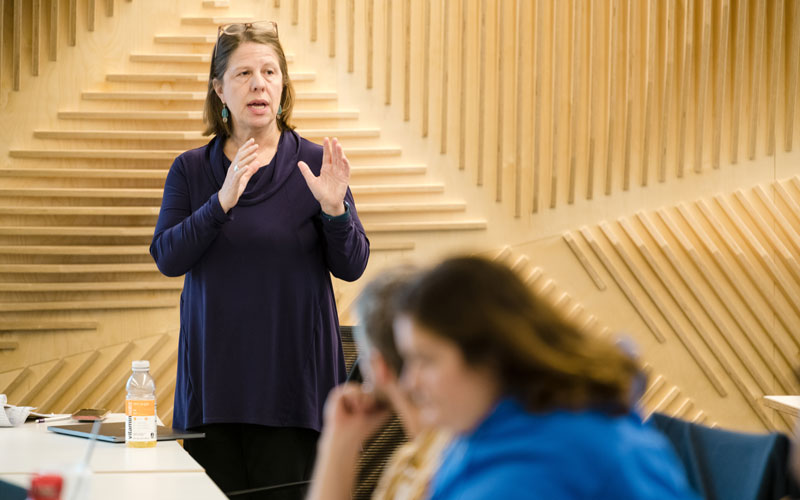Exploring AI’s Role in Entrepreneurship
A new winter quarter seminar led by Farley Director Hayes Ferguson invites students to consider how AI is transforming innovation across industries.

Artificial intelligence (AI) is reshaping nearly every corner of life, from the ways we work and learn to how new companies are built. Entrepreneurs in particular must understand this rapidly changing landscape.
Recognizing the importance of these shifts, Farley Center for Entrepreneurship and Innovation director Hayes Ferguson designed a new course to introduce students to the myriad ways AI technologies are being used to solve problems.
Supported by the Yang Family Curriculum Development Fund and running in the Winter 2026 quarter, ENTREP 395: AI Innovation in Action invites students with a range of academic backgrounds to assess how AI is transforming innovation across industries, the advantages and disadvantages of using it, and how they might use this tool to create solutions to real-world challenges.
In this conversation, Ferguson shares how the course, grounded in guest lectures and case studies, will provide students with an understanding of how AI is inspiring startups and transforming global enterprises and how students might thoughtfully apply it to their own ventures.
What inspired you to design this course on AI innovation?
At the Farley Center, we want to expose students to things that are shaping society. Right now, AI is that thing.
Students already know about — and use — generative AI like ChatGPT. But there's still a lot we can do in terms of educating them on other ways AI can be used. One surprising example I’ve come across while preparing for the course: Kraft is using computer vision to pick out ideal cucumbers to make pickles!
How do you want this course to influence the next generation of entrepreneurial leaders?
I want students to take away an understanding of how AI is being used across industries, and to have a spark lit that might inspire them to start a company or to innovate within an existing company. I want them to be aware of what's happening around them so they can seek out problems to solve and use AI tools to help solve them. We will also focus on the significant challenges AI poses. As we do in all Farley classes, we will address the importance of the ethical use of technology.
Who are some of the speakers you are excited to host?
I'm very excited about the line-up of speakers we’re putting together. One of them is Jonathan Ozeran, Vice President at Tempus AI, a biotech/AI company that builds data-driven tools for precision medicine across areas such as oncology.
We’re also excited to welcome Farley alum Tejas Shastry ('11, PhD '16), whose startup, Truleo, is helping police officers write reports with AI.
How is AI influencing the startup landscape?
Conventional wisdom is that you need a large team to build a company. But that’s changing. AI agents can help with marketing, building a business plan, and other tasks that typically are needed to launch a company. Now there’s talk that a solopreneur could build a trillion-dollar company. Maybe it will be one of our students!
How are startups approaching AI differently than global enterprises?
In some ways, it's easier for startups because they are unencumbered by existing revenue models and processes. While they may be lacking financial resources, startups have more freedom to challenge assumptions and experiment with new technology.
How does this course fit within the Farley Center’s broader mission of fostering entrepreneurship?
We already encourage students to experiment with AI in our classes, including NUvention, where students develop ventures. This course is designed for an audience that may not be ready to build, but that wants to learn more about the innovation happening all around them.
Stressing the importance of integrity is also a key part of what we do in all our classes, so we will focus on that as well.
Entrepreneurs work to solve problems, and so it’s important for them to well-versed in the ways AI can help do that responsibly. I want to inspire students to think big and boldly.
